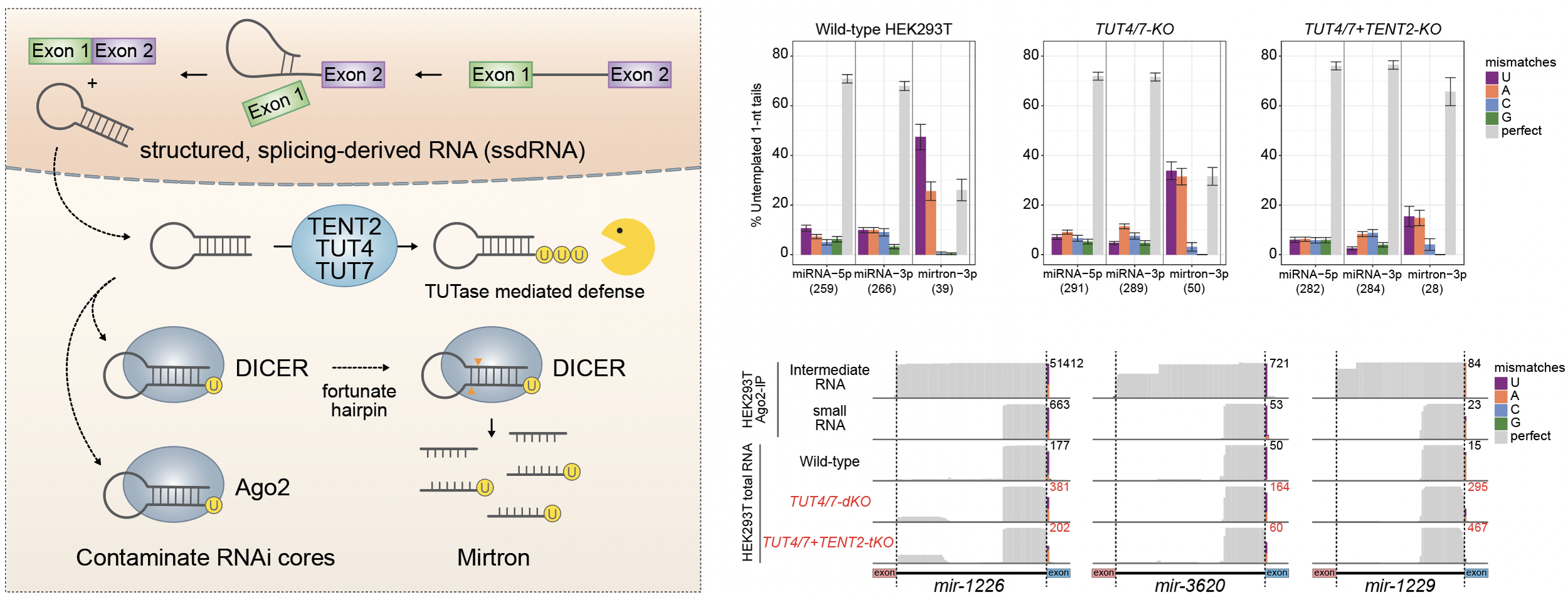Seungjae Lee, Ph.D
I am a postdoctoral fellow in the Developmental Biology Program at the Sloan Kettering Institute in New York. Here, I apply a range of scientific techniques, including genetics, biochemistry, and bioinformatics, in my quest to decipher the mysterious aspects of RNA regulation.Research
My research interest spans two distinct yet intertwined areas of biological study: post-transcriptional gene regulation by two types of non-coding RNAs.
1) Mechanisms of small RNA biogenesis and regulation
RNA interference (RNAi) is a naturally occurring biological process that regulates gene activity through small RNAs, leading to the targeted silencing or degradation of specific mRNAs. This phenomenon holds significant promise as a therapeutic tool, and researchers have actively explored its potential for treating various diseases. My primary research interest is understanding the genetic mechanisms that govern RNAi activity with direct relevance to therapeutic applications. Despite extensive study of the canonical mechanisms of small RNA biogenesis and regulation by traditional approaches, central RNAi regulators are still being characterized by recent technical innovations. From my combined expertise in genetics, biochemistry, and bioinformatics, I have focused on investigating and uncovering the functional mechanisms of RNAi regulators.
2) Regulatory mechanisms of alternative polyadenylation (APA)
3'UTRs are dominant sites of post-transcriptional regulation and mediate diverse functions such as positive and negative effects on RNA levels or translational efficiency, RNA localization, and protein-protein interaction. Moreover, as most genes express multiple 3'UTRs via alternative polyadenylation (APA), such regulation can be conditional. While APA landscapes differ broadly across cell types, developmental stages, and disease states, a key shortcoming in the field is the lack of molecular mechanisms that drive APA. My secondary research interest focuses on investigating the molecular mechanisms involved in 3'UTR isoform selection and exploring their widespread implications in biological functions. The context-specific regulation of APA has been linked to a range of human diseases. Thus, investigating the mechanisms underlying their formation is pertinent to understanding their relation to the therapeutics.
Please scroll down to explore each of the topics in more detail.
Publications
Seungjae Lee, Joseph I. Aubee, Eric C. Lai Regulation of alternative splicing and polyadenylation in neurons Life Science Alliance (2023)
Renfu Shang, Seungjae Lee, Gayan Senavirathne, and Eric C. Lai microRNAs in action: biogenesis, function and regulation Nature Review Genetics (2023)
Tzu-Chiao Lu, Maria Brbić, Ye-Jin Park, Tyler Jackson, Jiaye Chen, Sai Saroja Kolluru, Yanyan Qi, Nadja Sandra Katheder, Xiaoyu Tracy Cai, Seungjae Lee, Yen-Chung Chen, Niccole Auld, Doug Welsch, Samuel D'Souza, Angela Oliveira Pisco, Robert C. Jones, Jure Leskovec, Eric C. Lai, Hugo J. Bellen, Liqun Luo, Heinrich Jasper, Stephen R. Quake, and Hongjie Li Aging Fly Cell Atlas Identifies Exhaustive Aging Features at Cellular Resolution Science (2023)
Seungjae Lee, David Jee, Sid Srivastava, Acong Yang, Abhinav Ramidi, Renfu Shang, Diane Bortolamiol-Becet, Sebastian Pfeffer, Shuo Gu, Jiayu Wen, and Eric C. Lai Promiscuous splicing-derived hairpins are dominant substrates of tailing-mediated defense of miRNA biogenesis in mammals Cell Reports (2023)
Seungjae Lee, Yen-Chung Chen, FCA Consortium, Austin E. Gillen, J. Matthew Taliaferro, Bart Deplancke, Hongjie Li, and Eric C. Lai Diverse cell-specific patterns of alternative polyadenylation in Drosophila Nature Communications (2022)
Seungjae Lee, Lu Wei, Binglong Zhang, Raeann Goering, Sonali Majumdar, Jiayu Wen, J. Matthew Taliaferro, and Eric C. Lai ELAV/Hu RNA binding proteins determine multiple programs of neural alternative splicing PLoS Genetics (2021)
Lu Wei*, Seungjae Lee*, Sonali Majumdar, Binglong Zhang, Piero Sanfilippo, Brian Joseph, Pedro Miura, Matthias Soller, and Eric C. Lai (*equal contribution) Overlapping activities of ELAV/Hu family RNA binding proteins specify the extended neuronal 3’ UTR landscape in Drosophila Molecular Cell (2020)
Seungjae Lee, Jae-Sang Hong, Do-Hwan Lim, and Young Sik Lee Roles for Drosophila Cap1 2’-O-ribose methyltransferase in the small RNA silencing pathway associated with Argonaute 2 Insect Biochemistry and Molecular Biology (2020)
Do-Hwan Lim*, Seungjae Lee*, Min-Seok Choi, Jee Yun Han, Youngmo Seong, Dokyun Na, Young-Soo Kwon, Kyoung Sang Cho, KyeongJin Kang, and Young Sik Lee (*equal contribution) The conserved microRNA miR-8-3p coordinates the expression of V-ATPase subunits to regulate ecdysone biosynthesis for Drosophila metamorphosis The FASEB Journal (2020)
Do-Hwan Lim*, Seungjae Lee*, Jee Yun Han*, Min-Seok Choi, Jae-Sang Hong, and Young Sik Lee (*equal contribution) MicroRNA miR-252 targets mbt to control the developmental growth of Drosophila Insect Molecular Biology (2019)
Do-Hwan Lim*, Seungjae Lee*, Jee Yun Han, Min-Seok Choi, Jae-Sang Hong, Youngmo Seong, Young-Soo Kwon, and Young Sik Lee (*equal contribution) Ecdysone-responsive microRNA-252-5p controls the cell cycle by targeting Abi in Drosophila The FASEB Journal (2018)







